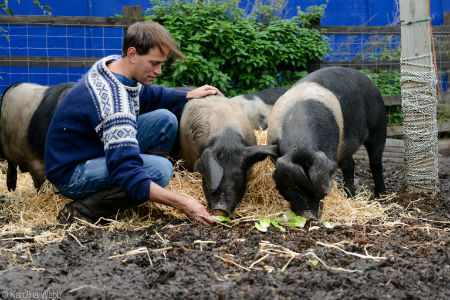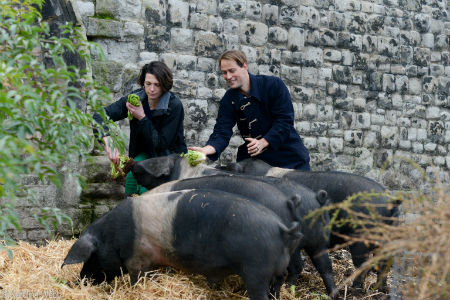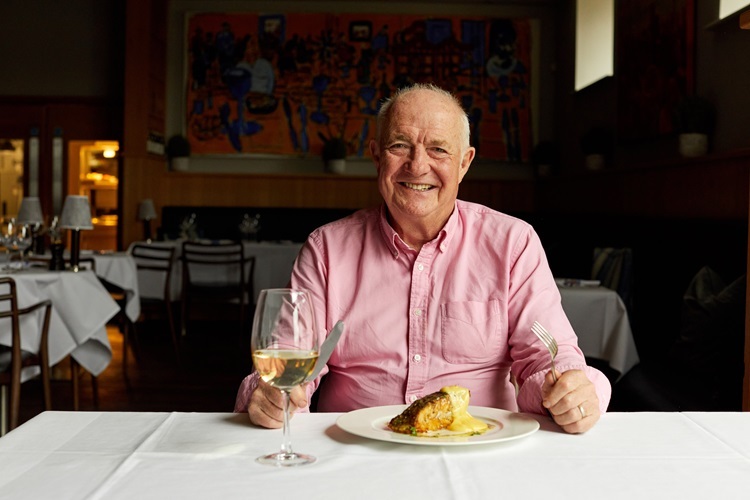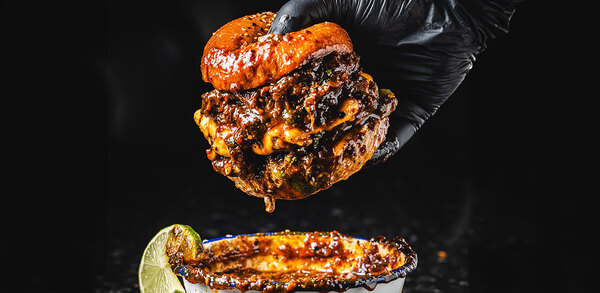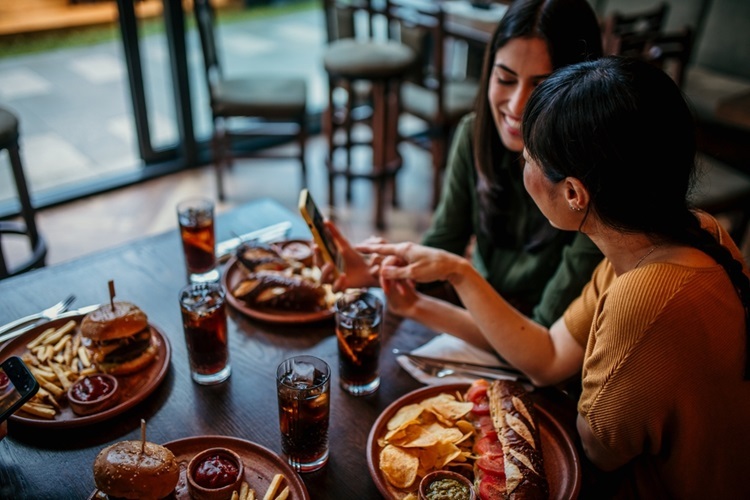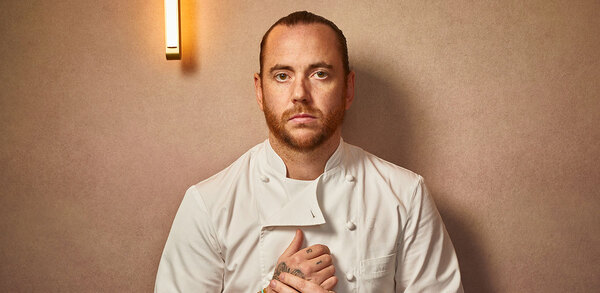Pig feed campaign to offer free food to 5,000 in Trafalgar Square
Restaurateur Thomasina Miers and Tristram Stuart of Pig Business are set to feed pork-based dishes to up to 5,000 people for free in Trafalgar Square in London next week, as part of a campaign to allow pigs to be fed food waste again.
Following the 2001 foot and mouth outbreak, which was blamed on uncooked restaurant food waste being fed to pigs, a Europe-wide ban on the practice was introduced.
Miers, executive chef of Wahaca restaurants, and Stuart, the winner of the international environmental award, the Sophie Prize 2011, together co-founded the Pig Idea campaign to highlight the environmental damage that the ban has caused - with rainforests being cut down to grow corn to import and feed to pigs in the UK, while caterers then have to pay to dispose of food waste that could otherwise be fed to pigs.
The Pig Feast, in Trafalgar Square at 12-4pm on Thursday 21 November, will see eight pigs born and bred on London food waste fed to up to 5,000 members of the public on a first come, first served basis.
The event has the support of several renowned chefs, food reviewers, and other celebrities, including: Hugh Fearnley Whittingstall, Valentine Warner, DJ Sara Cox, Giles Coren, Bruno Loubet and Stevie Parle.
Dishes will be prepared by restaurants including Wahaca, Bistrot Bruno Loubet, Cabana, the Delaunay, Paternoster Chop House, Le Pont de la Tour, and Soho House.
There will be a stage with live cooking demonstrations, a special kids' entertainment and education area, and information about the Pig Idea and other campaigns for better food and farming.
The pigs were reared at Stepney City Farm on a menu including brewers' grains, whey from a Peckham dairy, okara (a tofu byproduct) from an organic tofu producer on Brick Lane and unsold vegetables from a catering supplier. All the feed has been provided in line with current legislation, which means that it has not been prepared under the same roof as any meat, and nor was it prepared in a kitchen.
Tristram Stuart said: "Humans have been recycling food waste by feeding it to pigs for thousands of years. Reviving this tradition will help to protect forests that are being chopped down to grow the millions of tonnes of soya that Europe imports from South America every year."
Tristram Stuart on Pig Feast, why the current laws on pig feed need to be changed, and what caterers can do to help
What are the messages that you are trying to convey with the Pig Idea?
Where the law allows it, we should be feeding food that isn't fit for human consumption to livestock, over and above the other food waste management options. It is more economically viable certainly than landfill, but even combustion or anaerobic digestion. I calculated by feeding a tonne of food waste to a pig, as opposed to an anaerobic digestion path, which is the next best option, you save 20 times more carbon. The reason for that is that one of the biggest impacts we are having on the planet at the moment is the increase in food production, and in particular in the demand for livestock feed. It is global demand that is driving the extension of the agricultural frontier into the world's remaining forests and other wild places like the Cerrado grasslands in South America, which are then destroyed to provide people, and particularly Europeans, with products like soy. We import around 40m tonnes of soy to Europe every year that we then feed to livestock. And at the same time, we are wasting hundreds of millions of tonnes of food.
Stepney City Farm, working with them since the beginning of this project. They are turning local waste into delicious pork and that will be sold on their and the rest we are giving away at this event in Trafalgar Square on Thursday.
What can caterers do to help the campaign?
As a caterer who has prepared any of their food in a kitchen, it is illegal to provide any of that food waste to livestock under current European legislation. At the same time, those caterers when they are buying pork â" even if they are buying high standard, high welfare, ethical pork, and even if it is organic - are still contributing to the problem that we are talking about. There is also the social impact, because we are feeding pigs with food that people could eat â" maize and wheat and barley â" things like that. There are a billion hungry people in the world and that hunger is exacerbated by European countries buying and producing feed that could be fed to people. So the at the moment caterers are facing two problems â" on the one hand they are almost obliged to contribute to those big global problems and on the other they are having to dispose of food waste which costs them a lot of money. If they donât think that is a good idea, then we have a pledge on our website, www.pigidea.org for companies to voice their support.
How are you going to feed four to five thousand people with just eight pigs?
It is not even eight pigs: and there are two main problems â" firstly the way we produce meat, and the second is the amount of food that we eat. So we are serving quite small portions of pork. It doesnât take a lot of pork to make a pork taco, so you are going to have a good meal, but it is not going to be a massive amount of pork .On average about 50g per serving.
What was the rationale for the law banning giving waste food to pigs in the first place? What are the risks associated with it?
You canât get away from the fact that there are risks and they have to be managed properly and the problem is that before 2001 they were not being managed properly. In 2001, the foot and mouth outbreak was blamed on a pig farm that was collecting restaurant waste, and the law said that you had to cook restaurant waste before feeding it to pigs, and the conclusion was that the farmer was not cooking it, he was feeding it raw, some of that meat had been imported from other countries that had foot and mouth, that got into the pigsâ feed and we had the foot and mouth outbreak. The European response was to ban the feeding of food waste to pigs. The problem is that the law was brought in in the complete absence of research on the cost and benefits of the ban. No one stopped and actually looked into this. A temporary ban was arguably a sensible idea so that we had time to actually look at the problem, think how to deal with it, and the benefits of doing what we were doing, etc. Since that date, partly thanks to our campaigning, we got the British Government to commission a report on the costs and benefits of feed waste to pigs and the conclusion of the report was that more research was needed.
How do we propose to get the legislation changed - what system would you put in place to ensure that uncooked feeds is not provided to pigs again?
In countries like Japan and South Korea, there have been developed centralised food waste processing plants, so instead of just ad hoc farmers turning up to restaurants and taking back waste to their farms, which is difficult to enforce, there are are enforceable and regulated systems for the collection and processing of food waste. You put the food waste through a pipe so that you know exactly what temperature all of it has got to and if you want to monitor that as a regulatory authority you can have a thermometer in that pipe connected to a computer which uploads data all the time so you know that any food waste going into that farm has been properly cooked. There is no evidence that cooking food waste is unsafe. It kills off diseases, and one of the things that they have done in Japan is that they have then innoculated the food waste with lacto bacillus, and basically kind of turn it into a food waste yoghurt which then gives it a good shelf life to then get out to the farms. The farmers turn that into pork and sell it on the same shelves that they got their food waste from, so it is a closed loop system. Nothing moves more than a few kilometres and the pig farmers save about 50% on their food costs.
There has to be a European system, not just British. It has to be enforceable across the EU. Centralised plants are more easily enforceable and more easily regulated.
Who pays for these centralised plants?
They make money. At the moment caterers and all other food waste producers have to pay an awful lot of money to get rid of their food waste, and the reason they have to pay that money is because the cost of landfill is very high. Even the anaerobic digestion (AD) industry â" people think of that as a way of getting value out of food waste, and you do get some value through energy - does not produce enough energy to make it profitable on its own. That means you still have to provide a gate fee to the waste producers, between £40-100 a tonne. Being allowed to turn that food waste into feed, which is more valuable than energy that is produced through AD, would make the industry profitable without the huge injection of cash that we have to give to AD to get AD off the ground.



